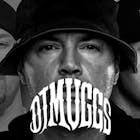“It had me speechless for a few seconds because I know how different the Hip-Hop game is than it was 30 years ago when we came in,” says Sen Dog, who is joined in Cypress Hill by partner-in-rhyme B-Real and percussionist Eric “Bobo” Correa. “I feel great about it because at this point, I have no expectations for any of our albums or anything that we do. We’re just putting the art out of whoever gravitates to it, gravitates to it. I try to live that by that code.”
Back In Black’s success comes with a noteworthy origin story. As Cypress Hill worked with producer and former Cypress Hill member DJ Muggs on its 2018 album, Elephants On Acid, the group would take extended breaks given the band members’ respective schedules. The pauses gave B-Real an idea.
“I thought it'd be dope to do like a boom bapish type album because what we were doing with Elephants On Acid was very much like a Cypress Hill, dark, psychedelic, gritty, grimy, dusty type of sound,” B-Real says. “We know we carry both types of Hip-Hop fans, folks that like that dark shit and the other contingency that likes that hip-hop, boom bap style. I've always been a fan of [Black] Milk's production, so I thought it'd be kind of tight to get him to produce an album.”
After working on three songs with Black Milk to see if the right vibe was there, B-Real and Sen Dog were all-in. Back In Black was in motion. Cypress Hill also decided to mix things up by having Sen Dog rap first on several Back in Black selections.
“That was supposed to be something that we wanted to do back since back in the days,” Sen Dog says. “We haven’t done a lot of that. I've usually been on the second verse or on a song by myself, so it feels kind of good to be the one to throw out that first rhyme in a song.”
Even though Black Milk produces Back In Black and Sen Dog rhymes first on several songs, Cypress Hill also remains true to one of its longstanding missions: championing cannabis. On Back In Black’s “Open Ya Mind,” for instance, the group addresses the legal and educational environments surrounding the drug.
“We’ve always felt that the educational aspect of talking about cannabis and bringing it to the forefront was important,” B-Real says. “We knew that there were a lot of people out there that consume, everyday smokers like us, but that didn’t really give a shit about the politics of it or the trajectory, where it was going. People weren’t necessarily that mindful of it. When we started, it was a part of who we were. We were consumers, casual users, obviously, but the difference was that we were reading the High Times Magazine, the freedom fighting articles and all that stuff.”








